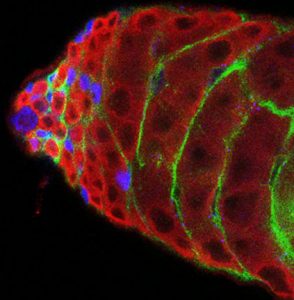PhD Studenship in soma-germline communication and signaling regulation in the Drosophila testis (Medway School of Pharmacy, Universities of Kent and Greenwich)
Posted by Fani Papagiannouli, on 13 February 2020
Closing Date: 15 March 2021
A PhD position is available in the lab of Fani Papagiannouli (@Medway School of Pharmacy, Universities of Kent and Greenwich) to study soma-germline communication and the role of cortical polarity in signaling regulation during Drosophila spermatogenesis. The position is funded by a Medway School of Pharmacy Post Graduate Research Scholarship.
Stem cells are critical for multi-cellular development, since they supply the cells that build up our bodies and replenish, as we age, worn out, damaged, and diseased tissues. Stem cell therapies use the power of stem cells to generate treatment for medical diseases by replacing lost or damaged cells. Due to the high degree of conservation to humans, Drosophila has led ground-breaking discoveries in genetics, cell biology, human disease and stem cell-related processes.
Research in Papagiannouli’s lab focuses on understanding how the communication between the germline and the squamous somatic cyst cells encapsulating them is established and maintained, in particular how the somatic cyst cells support the developmental decision of the germline in the Drosophila testis (1).
You will be integrated in the lab of an enthusiastic investigator who will support you to develop the skills required for your career development. We will employ a highly innovative proximity biotinylation assay coupled to mass spectrometry, along with cutting-edge array-tomography with scanning electron microscopy (AT-SEM) to elucidate the basic principles of squamous epithelial cell function and cross-communication with the germline. Excellent training in state-of-art Drosophila genetics, histological and molecular approaches, innovative genomic and proteomic techniques and high-resolution microscopy (1, 2), will help you investigate key stem cell and germline organizing principles. Studying the relatively simple somatic cyst cells will provide insights on the underlying causes that drive human squamous epithelia to develop squamous cell carcinomas. The regulatory strategies uncovered here will unravel fundamental mechanisms of stem cell function beyond Drosophila and will aid the identification of new approaches in regenerative medicine and infertility.
You will be part of a dynamic working environment at Medway School of Pharmacy and the Universities of Kent and Greenwich at Medway Campus, and will have access to shared facilities such as advanced microscopy and proteomic tools. You will also work alongside our world-renowned collaborators from Stanford University and the University of Lausanne with complementing expertise.
We look for an enthusiastic, talented and motivated student with the ability to work both independently and as part of a team that can quickly integrate into an interdisciplinary environment. The successful candidate should have knowledge on basic molecular and protein work, however experience in confocal microscopy, immunohistochemistry, genome wide and proteomic techniques or Drosophila genetics would be an advantage. Excellent writing and communications skills in English are necessary.
- Papagiannouli, C. W. Berry, M. T. Fuller (2019), The Dlg-module and clathrin-mediated endocytosis regulate EGFR signaling and cyst cell-germline coordination in the Drosophila testis, Stem Cell Reports, May 14, 12: 1-17 (doi.org/10.1016/j.stemcr.2019.03.008)
- Papagiannouli, L. Schardt, J. Grajcarek, N. Ha, I. Lohmann (2014), The Hox gene Abd-B controls stem cell niche function in the Drosophila testis, Developmental Cell 28(2):189-202

For more details about the post visit: https://www.kent.ac.uk/scholarships/search/FN24SGCIDS01
To apply visit: https://www.msp.ac.uk/postgraduate/?course_id=785&course_level=postgraduate
Deadline for application is 31st of March 2020. The Scholarship is available to both UK and EU nationals. Self-funded applicants and those who have access to international scholarship applications, please contact directly Dr. Fani Papagiannouli (f.papagiannouli-227[at]kent.ac.uk).
For more information about the lab and the project visit our webpage: https://www.msp.ac.uk/person/fani-papagiannouli or contact f.papagiannouli-227[at]kent.ac.uk
As an equal opportunities institution we welcome applicants from all sections of the community regardless of gender, ethnicity, disability, sexual orientation and transgender status. All appointments are made on merit.


 (No Ratings Yet)
(No Ratings Yet)